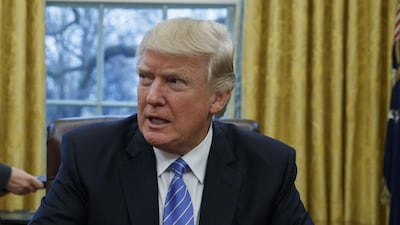A majority in the US House of Representatives on Wednesday voted to reverse President Donald Trump's “Muslim ban”, which restricts arrivals from some countries in the Middle East.
The No Ban Act passed the Democratic-majority House with members voting mainly along party lines.
The final vote was 233-183 in favour of the bill, with only two Republican legislators voting yes.
Palestinian-American Congresswoman Rashida Tlaib clapped in celebration as she announced the final vote to the chamber.
Maya Berry, executive director of the Arab American Institute, described the House vote as a milestone in “rejecting bigotry".
“We applaud the House on this important milestone of officially rejecting the bigotry enshrined in President Trump’s Muslim ban,” Ms Berry said.
She credited the passage to a broad coalition of advocacy groups, including hers, and described it as evidence that the House had “heard the demands of the American people in support of immigrants, refugees and asylum seekers".
The bill is designed to repeal Mr Trump's executive orders since 2017, which placed immigration and visa restrictions on mostly Muslim-majority countries.
These included Libya, Iran, Somalia, Syria and Sudan, as well as Nigeria and Venezuela.
The act imposes limits “on the President's authority to suspend or restrict aliens from entering the United States", a Congressional summary of the bill read.
It also “prohibits religious discrimination in various immigration-related decisions”.
The vote was preceded by a debate on the bill.
Congressman Hakeem Jeffries, chairman of the House Democratic Caucus, called the ban “hateful” and “unconscionable”.
Republican politicians who opposed the ban's reversal accused its sponsors of undermining the president’s ability to keep the country safe.
Republicans have called Mr Trump’s ban this year on travel from China another measure that has saved lives during the pandemic.
They accuse the Democrats of trying to strip away the authority for the president to save lives.
The White House has repeatedly defended the ban as being in the interests of US national security.
In 2018, the US Supreme Court in a narrow vote, 5-4, upheld the legality of the ban and said Mr Trump acted lawfully in imposing travel restrictions.
Civil rights groups including the Human Rights Campaign, the American Civil Liberties Union and the AAI threw their support behind the bill since it was introduced last year.
But it is unlikely to pass the Republican-led Senate.
On Monday, the Democratic Presidential nominee Joe Biden told the Muslim-American group Emgage Action that he was committed to scrapping the ban as a priority.
"If I have the honour of being president, I will end the Muslim ban on day one," Mr Biden said.


